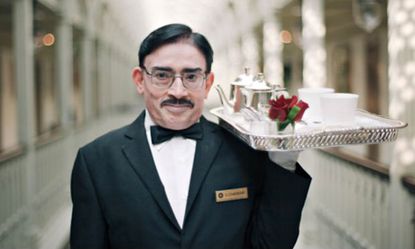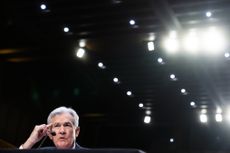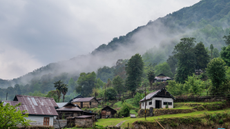Hotel India: new generation demands new kind of luxury
Calling time on the bell-boys, housemaids and even the guests at the Taj Mahal Palace hotel in Mumbai

In a previous job I used to review hotels from time to time, and often they were expensive ones that catered to rich people travelling in poor countries.
Hotel India (BBC2) examines one such establishment, the Taj Mahal Palace in Mumbai, and the characters who come together within its high walls.
Hotels like this can go one of two ways. The ones designed for business travel aspire to an elevated internationalism, armouring themselves in marble, steel and a sheen of efficiency that denies all connection with their host country's culture and customs. One or two breakfast items might raise an eyebrow, but there's little else to unsettle the guest with thoughts of the outside world.
Subscribe to The Week
Escape your echo chamber. Get the facts behind the news, plus analysis from multiple perspectives.

Sign up for The Week's Free Newsletters
From our morning news briefing to a weekly Good News Newsletter, get the best of The Week delivered directly to your inbox.
From our morning news briefing to a weekly Good News Newsletter, get the best of The Week delivered directly to your inbox.
Then there are those intended for the plutocratic leisure traveller, which fetishise history, culture and connection with place, and spell out their authenticity in dark wood and leather. If it's not classically inspired or locally sourced, you won't find it on the menu.
The Taj Mahal Palace, it seems, is moving from the second camp into the first. Time has been called on the long-serving bell-boys and housemaids, and their equally long-staying guests. Having dedicated their lives to the provision or pursuit of hospitality, the old generation must now make way for a more transient class of worker and traveller, which provides and demands a more homogenised standard of service.
"I think the kind of luxury that people in India expected of five-star hotels is not going to be there in the future," says the hotel's general manager. "You're not going to come back and see 50 employees who've been here for the last 30 years. That's not going to happen."
All travel journalism is a war against cliché, and Hotel India does not come off the battlefield unscathed. The Taj is "a mirage in the middle of the city". Its gardens, an oasis of peace surrounded by the clamour of rickshaws and poverty, are serenaded by a soundtrack of sitars. The words "land of contrasts", while not actually spoken, are strongly implied.
In fact the programme is fighting cliché on two fronts, the other being that of the fly-on-the-wall reality show. In this genre even the most humdrum of tasks must be fortified with drama. Only a fool would have bet against finding a scene in which the boss, with one eye on the camera, orders an underling to repeat a simple, menial task – and this time to do it properly.
These slips aside, Hotel India was a sophisticated example of its breed. At its best it did not force its subjects into a preconceived narrative, but allowed them the space to air their sometimes unexpected thoughts.
When the cameras ventured out among the street people who live within spitting distance of the hotel perimeter fence, they found an oddly symbiotic relationship between the richest and poorest in the city.
"If the Taj wasn't there, what would we do?" said one woman, rubbing together her fingers and thumb. "People from all over the world come to see it, and that's how we make money to buy our food. If it wasn't for them we would die of hunger."
She is, however, bemused by the tendency of guilt-ridden guests to hand out their fluffy spa footwear. We would never wear those white slippers in the streets, she says, smiling indulgently at the thought. They would only get dirty.
If the mood music outside the hotel walls is somewhat Dickensian, inside it owes more to Wes Anderson. Maria, one of the long-term guests, might have checked in directly from the Grand Budapest Hotel and its cast of elderly eccentrics.
A meticulously preserved 83-year-old American, she spends her summers in Greece and her winters in the Taj. "I'm very lucky," she says, dabbing her wrinkleless cheeks with powder.
The statement comes like a reflex, an acknowledgement of the envy that her lifestyle must often provoke. But then her voice changes.
"It gets a little… " she says, and trails off. Then: "Time drags. I don't have many friends."
Soon there will be one less familiar face in her adopted home. The retirement after 42 years' service of Mr Chaskar, a hotel butler, struck another mournful note.
"I am closer to my hotel than to my family," he said, clearing away someone else's afternoon tea, silhouetted against a bright window and beyond it the grand skyline of colonial Mumbai.
If Hotel India were fiction, these two would find happiness together in the twilight of their lives. But for all the artful editing and cinematography, the programme is stuck with prosaic reality.
Next week's episode looks to the hotel's roaring trade in business conventions, which is where its future lies. Maria and Mr Chaskar are slipping into its past.
Hotel India continues on Wednesday at 8pm on BBC2
Holden Frith tweets at twitter.com/holdenfrith
Create an account with the same email registered to your subscription to unlock access.
Sign up for Today's Best Articles in your inbox
A free daily email with the biggest news stories of the day – and the best features from TheWeek.com
Holden Frith is The Week’s digital director. He also makes regular appearances on “The Week Unwrapped”, speaking about subjects as diverse as vaccine development and bionic bomb-sniffing locusts. He joined The Week in 2013, spending five years editing the magazine’s website. Before that, he was deputy digital editor at The Sunday Times. He has also been TheTimes.co.uk’s technology editor and the launch editor of Wired magazine’s UK website. Holden has worked in journalism for nearly two decades, having started his professional career while completing an English literature degree at Cambridge University. He followed that with a master’s degree in journalism from Northwestern University in Chicago. A keen photographer, he also writes travel features whenever he gets the chance.
-
 'New arrivals are more than paying for themselves'
'New arrivals are more than paying for themselves'Instant Opinion Opinion, comment and editorials of the day
By Harold Maass, The Week US Published
-
 6 stylish homes in Portland, Oregon
6 stylish homes in Portland, OregonFeature Featuring a wall of windows in Collins View and a historic ballroom in Portland Heights
By The Week US Published
-
 What's next for US interest rates?
What's next for US interest rates?The Explainer Stubborn inflation forestalls anticipated rate cuts
By Becca Stanek, The Week US Published
-
 On the trail of India’s wild lions at Sasan Gir National Park
On the trail of India’s wild lions at Sasan Gir National ParkThe Week Recommends The sanctuary is a 'roaring' conservation success
By The Week UK Published
-
 Kerala: one Indian state, four exhilarating ways
Kerala: one Indian state, four exhilarating waysThe Week Recommends The southwestern region pretty much has it all, from beachfront, to port metropolis, to verdant mountainside
By Scott Hocker, The Week US Published
-
 Tropical Modernism: Architecture & Independence – rise and fall of unique design
Tropical Modernism: Architecture & Independence – rise and fall of unique designthe week recommends A 'nuanced' and 'scholarly' examination of European architecture across the 'late British empire'
By The Week UK Published
-
 7 of the world's most unusual museums
7 of the world's most unusual museumsThe Week Recommends Yes, Beijing has a museum devoted to tap water
By Catherine Garcia, The Week US Published
-
 India's spicy dispute over the origins of butter chicken
India's spicy dispute over the origins of butter chickenWhy Everyone's talking about Rival claims at the 'centre of a saucy real-life drama roiling India'
By The Week UK Published
-
 Poonam Pandey: the Indian model who faked her own death
Poonam Pandey: the Indian model who faked her own deathWhy Everyone's Talking About The Bollywood star has a reputation for outlandish stunts
By Sorcha Bradley, The Week UK Published
-
 A different hotel for every need this February
A different hotel for every need this FebruaryThe Week Recommends Get away from it all at these five enticing properties
By Catherine Garcia, The Week US Published
-
 A journey into the remote hills of Nagaland
A journey into the remote hills of NagalandThe Week Recommends Situated in the northeast of India, Nagaland is 'elixir for the soul'
By The Week UK Published